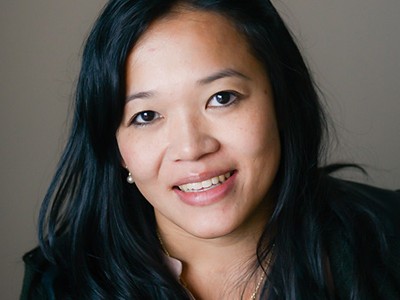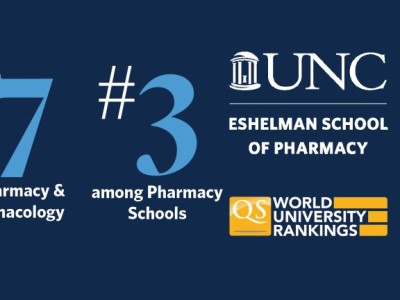March 31, 2015

The UNC Eshelman School of Pharmacy tackled the hot-button issue of provider status in March with its Asheville Summit for Provider Status.
The summit provided an opportunity for students to learn about provider status and hear about successful models of integrating pharmacists into health care. The summit was attended by more than 120 students, state officials and representatives from nine pharmacy schools from across the country.
“The goal was to bring students from all over the region and educate them,” says Emily Eddy, pharmacy student at the School’s branch in Asheville and chair of the summit’s planning committee. “Many students aren’t taught models for integrating pharmacists into health care, and this was a way to share perspectives on the issue.”
Underused Providers of Care
In 1996, the town of Asheville, North Carolina paid for residents with chronic conditions to have regular visits with a pharmacist, known as the Asheville Project. After six months of funding the project, patient health improved, hospitalizations decreased, and the city saved four dollars for every one dollar that it invested.
Since then, pharmacists have been integrated into primary care clinics at the Mountain Area Health Education Center, and a pharmacy implementation team has been working to spread this embedded pharmacist model of primary care for Medicare patients throughout Western North Carolina.
When pharmacists are included in patient care, public health improves. Numerous studies across the nation have shown that including pharmacists in patient care reduces hospital readmission rates, decreases cost of care and improves patient outcomes.
Unfortunately, models integrating pharmacists have not been widely adopted, and a 2011 report to the surgeon general found that pharmacists are widely underused despite their benefit.
Pharmacists cannot bill Medicare for clinical services they provide because they are not recognized as providers in the Social Security Act. The result is that pharmacists are not often hired into physician practices, says Mollie Scott, PharmD, regional associate dean for the School’s Asheville satellite campus.
“Provider status would improve patient access to pharmacists, improve health care and advance the pharmacy profession,” Scott says. “Graduates now are being trained for these comprehensive roles that don’t widely exist; provider status would create a financial model that sustains the work pharmacists are already doing.”
These conversations are moving towards reality as a bill supporting provider status for pharmacists was introduced to the U.S. House of Representatives along with a companion bill in the U.S. Senate in January.
“As we think about health care reform and are moving towards models that are more affordable and improve the patient experience, we want to make sure that pharmacists are able to be a part of that comprehensive patient care,” Scott says.
A Student-Led Summit
“This was largely a student-led effort,” Scott says. “They were the ones that reached out to other schools, networked to other students and organized the event. I’m really proud of the level of commitment they had.”
Most of the attendees were students, and the summit presented an enormous networking opportunity for rising pharmacists, Eddy says.
“We were able to bring students from all over the region to educate them about different models for pharmacy care and ways to advocate provider status,” Eddy says. “I think we were successful; these are conversations that the pharmacy community benefits from.”
The summit was attended by fifteen different speakers, including George Butterfield, JD, U.S. representative for North Carolina; William Lang, senior policy adviser at the American Association of College of Pharmacy; and Sarah McBane, PharmD, president-elect of the California Pharmacist Association.
“The next step is discussing the implementation of provider status and how to partner with physicians,” Scott says. “This is a summit we may be able to do every year; there are lots of things to talk about for the future of pharmacy.”
In addition to Eddy, other students involved in the summit planning were Jennifer Godbold, Chandler Gurley, Samantha Patton, Claire Davis, Annie Bernacchi, Kelsy Combs, Crista Hughes, Helen Northrup, Jared Chiusano, Stephen Canady and Ryan Marshall.
By Aren Besson
Latest News

Delesha Carpenter promoted to full professor

Developing new ways to treat heart attacks without surgery


